






Change
Upstander



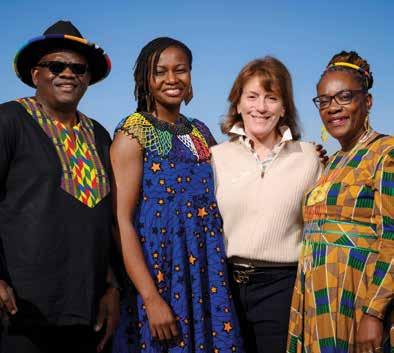
Get

“It is time that we do not put it upon our students to be able to resist all that pulls at them on their devices.” p.


Who’s your favorite superhero?
When I first moved to Seattle, I experienced the infamous Seattle Freeze. Try as I might, each hand I extended was met with whatever the social equivalent of a cold fish is. Although, to be fair, it was probably more lukewarm than cold. Regardless, my Midwestern sensibilities were tested every time my invitations to get together garnered enthusiastic responses — “I’d love to!” or “We definitely have to do that!” — followed by nothing. It’s unnerving.
But, eventually I found my people, despite the Freeze, and after nearly two decades of living here, am acutely aware of just how important community is, especially for parents. That’s why community is at the heart of our April issue. Each year, we spotlight inspiring people and organizations who lift up Washington kids and families, enhancing their lives and making the world a little bit better.
These community builders run the gamut. They are grassroots organizers mobilizing people to vote during an especially important election year (p. 14). They are advocates for sensible school cellphone policies (p. 16). They are activists working to free the innocent people who are still being held hostage in Gaza (p. 18). They are Seattle’s biggest fans, reinventing the Emerald City’s vibrant downtown district to ensure it’s a welcoming space for residents and visitors alike (p. 20). They are religious leaders building bridges across beliefs to find unity (p. 22). They connect the African diaspora in the city, together with love (p. 24). They are mentors who use sports to close the opportunity gap for kids (p. 32). They provide support to families who have children with severe medical issues (p. 34). And they empower underprivileged teens through fashion (p. 36). Each is inspiring in their own right. As a group, they are a formidable force for good.
After you’ve met our superheroes, check out another place to find community — local food halls (p. 47). Consider them your new secret weapon in the picky-eater food wars. Then take a stroll through Ravenna (p. 51). With its charming parks and inviting eateries, it’s an ideal place to spend a low-key day. As always, our jam-packed monthly Play List has what you need to make it through April’s showers.
— Allison Sutcliffe, managing editorCONTACT
INFORMATION
Advertising information 206-709-9026 or advertising@parentmap.com
Fax 206-709-9031
Calendar submissions calendar@parentmap.com
Editorial submissions editor@parentmap.com
Distribution distribution@parentmap.com
Administration 206-709-9026, parentmap.com
Subscriptions subscriptions@parentmap.com
Subscription rate 1 year: $12
ParentMap is proud to highlight local area nonprofits making a difference in our community as part of our Giving Together campaign.
Camp Kindness Counts. For more than 10 years, Camp Kindness Counts has been committed to serving children, caregivers and educators, fostering wellbeing and kindness. Camp Kindness Counts does this by providing tools for character development that encourage social-emotional well-being, and opportunities for service and social action to help build a generation of compassionate, courageous and kind leaders and community members. The volunteer-led nonprofit supports those wanting to make a difference in their communities and encourages youth and families to take the lead by providing free consultation and free curriculum/resources to start a Kind World Explorers club, Kind Leadership Camp, or Family Community Service Event with online support.
LEARN MORE: campkindnesscounts.org















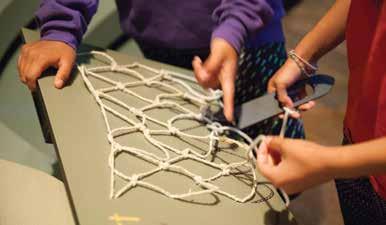

MAY
2023
2024


Sunny Xia conductor
Kaia Selden violin – 2024 Young Artist
Ravi Albright tabla
Swil Kanim narrator
Seattle Symphony
ROSSINI Overture to Barber of Seville (Original Italian Version)
BEETHOVEN Violin Concerto
REENA ESMAIL Vishwas: Testament
JEROD IMPICHCHAACHAAHA’ TATE Spirit Chief Names the Animal People
Journey along with the Great Chief in this tale based on an Okanagan story, as he calls all the Animal People for a naming ceremony. Join the mischievous coyote, the lumbering bear, the swimming and jumping salmon, and the majestic eagle as they petition for certain names and powers.
Sunny Xia’s position is generously underwritten as the Douglas F. King Associate Conductor.
The Arakawa Foundation proudly supports the Seattle Symphony’s Community Partnerships for Youth and Education. Additional support is provided by Delta Air Lines.



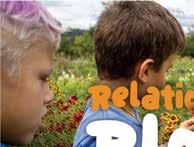
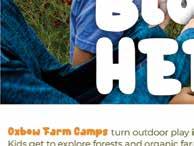

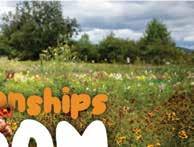














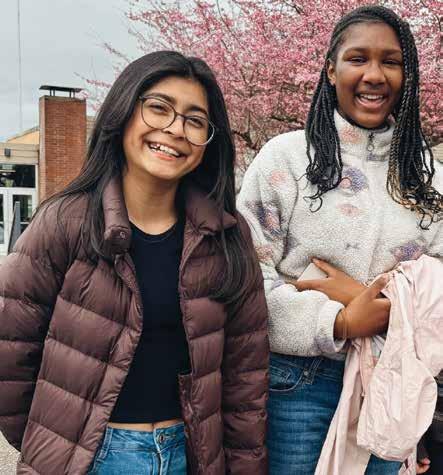





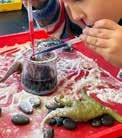



Spring is finally here. For many kids, spring is the time to visit baby animals at local farms, plant seeds in a backyard garden, and enjoy colorful spring blooms on The Quad at the University of Washington or during the Skagit Valley Tulip Festival. For many school-age kids, it also means state testing time. Each spring, students in grades 5, 8 and 11 take the Washington Comprehensive Assessment of Science (WCAS), and students in grades 3 through 8 and 10 take the Smarter Balanced ELA and Math Assessments. There are many ways parents and caregivers can help their kids find success before, during and after test days. Here are a few tips:

• Make sure your kids get plenty of rest and regular exercise and are eating healthy meals. These steps will help reduce stress and anxiety, and improve recall and cognitive function in the days leading up to the test.
• The Washington Office of Superintendent of Public Instruction (OSPI) also recommends that parents talk to their kids about the purpose of the test before test day and reassure students that you and their teacher are there to support them so they can do well.
• Be sure your student gets to school with plenty of time to spare and with all the supplies they’ll need to reduce stress and be successful on test day.
• Students should read through the directions to each section carefully and be sure they understand them. If they don’t, they should ask questions before starting the test.
• While taking the test, students should read each question carefully and make sure they understand what the question is asking before they answer it.
• A student should answer the questions they know first and save those that aren’t as easy to figure out for last.
• If there’s time, students should review their answers before submitting the test.
• OSPI recommends that parents review test results with their kids, helping them to understand what they did well and where they might need additional support.
• If your student has areas of concern, reach out to your child’s teacher to determine how best to support learning at home, such as tutors, extra online practice or other opportunities.
— Allison Sutcliffe

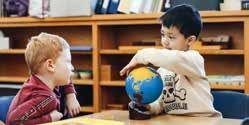














Read more about our 2024 Superheroes!
ParentMap’s annual “Superheroes” issue celebrates the passion of local leaders working tirelessly to improve the lives of kids and families in Washington state. This year’s superhero lineup spotlights trailblazing community builders who are shaping a brighter future for us all. It’s our hope that their stories will inspire you to make a difference in your own community. Please join us in celebrating their achievements!
These two superheroes met more than a decade ago, during a Seattle Arts & Lectures series about the thenupcoming 2012 presidential election campaign. Christina Gould was working the event, and professor David Domke was one of the speakers. Looking back, Gould recalls how taken she was with Domke’s thesis. “His lectures, which take an historical approach to the current political situation, then and now, are accessible, engaging and impeccably researched. Delivered with charm and
“It’s not enough to hope, or want, or wish or desire,” he quotes a personal hero of his, John Lewis, “We have to move our feet.”
— David Domke
earnestness — with the best PowerPoints ever by a professor in shorts, no matter the temperature — it captivated me.”
At the time, Domke was a tenured professor in the Communications Department at the University of Washington, where he focused on the racial and religious dimensions of
American politics. The publication of his first book in 2004 launched him into the public spotlight, and soon he was helping grassroots organizations and candidates running for office with their communication strategies. As the years went on, he became more involved in the public arena, but it was the 2016 election that had a profound impact on his professional focus, and he made a decision to leave academia.
That’s when their stories come back together — both Gould and Domke now work at Common Power, an all-volunteer initiative that works to “foster, support and amplify a democracy that is just and inclusive.” Domke established the organization in 2018 and serves as its associate director; Gould is a valued advocate, contributor and volunteer.
In conversation, both spoke about their desire to uphold democracy as a motivation for their work. “Losing it is not acceptable; the consequences if we do are horrifying,” explains Gould. And according to Domke, the way to uphold it is to be active. “It’s not enough to hope, or want, or wish or desire,” he quotes a personal hero of his, John Lewis, “We have to move our feet.” Gould echoes this resolve. “We have a lot to lose as a society if we do not participate.”
Common Power serves as an “on-ramp” for people looking to participate, to move their feet. The metaphor Domke uses to describe the organization is to call it the Apple store for civics. It provides volunteers with the opportunity to attend lectures, to participate in fieldwork — making phone calls, registering people to vote, writing letters — to build community and
What book or podcast are you recommending right now?
Gould: I recommend the historian Heather Cox Richardson’s book
“Democracy Awakening: Notes on the State of America.” It is a narrative that explains how our democracy teeters on the brink of autocracy and how we can turn it back.
Domke: I’m recommending “The Ezra Klein Show” [pocast] as well as “Freedom’s Dominion: A Saga of White Resistance to Federal Power” by Jefferson Cowie — a book that has had the most influence on me in the last few years. It’s a Pulitzer Prize winner and examines the way in which white Americans have defined what “freedom” is.
How can parents teach children to repair a broken world?
Gould: I think parents can model and teach their children of all ages to be kind and generous and that “all people are different people” and that’s okay. And that civic engagement is an important part of the whole that fosters community, connection and belonging, which benefits all.
Domke: They can decide to try and make a difference, and to say, with integrity, to their children, “I don’t know if we can make this place a better place, but we’re going to try.”
What daily habit or routine is important to you?
Gould: My daily routine is to walk my dog, Ella, which keeps us both healthy and happy and centered!
Domke: I lap-swim about an hour almost every day. That time is incredibly generative and meditative. It’s also separated from technology and all of the fears or anger or whatever else I’m feeling. It’s a chance to just reflect and think. That hour is precious and a privilege.

connections, to share a sense of belonging and, according to Gould, “to participate in history in the making while understanding our country’s past history.”
Domke notes that although many people feel strongly about issues and want to take action, they often feel overwhelmed by information, frustration or even fear. Many opt out of participating because it feels like their actions won’t have an impact. In response, Domke refers to a
quote by Edward Everett Hale about his cousin Helen Keller: “I am only one, but I am one. I cannot do everything, but I can do something. And because I cannot do everything, I will not refuse to do the something that I can do.” As Domke says, “Democracy is a verb.” He believes that if you show up and keep showing up, good things can come out of it.
When asked how ParentMap readers can get involved and support Common Power’s
work, Gould encouraged people to exercise their right to vote. “I believe that it is a precious right that we can all exercise, albeit some more easily than others; it is an action that can give us a voice, preserve our freedoms and democracy.” She also encourages readers to look into Common Power, learn about the organization and take action in whatever way suits them — through time or treasure. ■
— Allison Sutcliffe
When Surgeon General Vivek Murthy released his public advisory detailing the effects of social media on the mental health of American youth last spring, it echoed what many parents, caregivers, educators and health-care providers had long suspected: that social media can be harmful to young people, and that its use is widespread among teens and tweens.
The report highlights the urgency of the situation and offers support to many parents who are feeling overwhelmed by social media’s everchanging landscape and the safety concerns it poses. The advisory calls on policymakers, technology companies and researchers to provide muchneeded “information and tools to make social media safer for children.” As with so many parenting challenges, we have discovered once again that it takes a village.
Families in Washington state can now count two more advocates in their village: Delaney Ruston, M.D., and state Rep. Stephanie McClintock.
While filming her groundbreaking documentary “Screenagers” with film partner Lisa Tabb, Ruston was struck by the increasing number of students absorbed in their cell phones. She knew, through discussion with teachers and
“It is time that we do not put it upon our students to be able to resist all that pulls at them on their devices.”
— Delaney Ruston, M.D.
students and her familiarity with emerging research, that this digital immersion came with significant drawbacks: declining academic performance, less time with teachers and peers, and a surge in cyberbullying.
While research into smartphone use in schools was being conducted, Ruston noticed research on effective school policies was lacking. So she and Tabb conducted their own research, later published by CNN. Their findings uncovered problem areas. More than half of the country’s middle schools allowed students to carry cell phones throughout the day, while at the same time more than 80 percent of parents expressed a desire to prohibit their children from using phones during school hours.
McClintock had made similar observations, albeit on a smaller scale. She noticed how frequently she and her two kids (then in high school) would
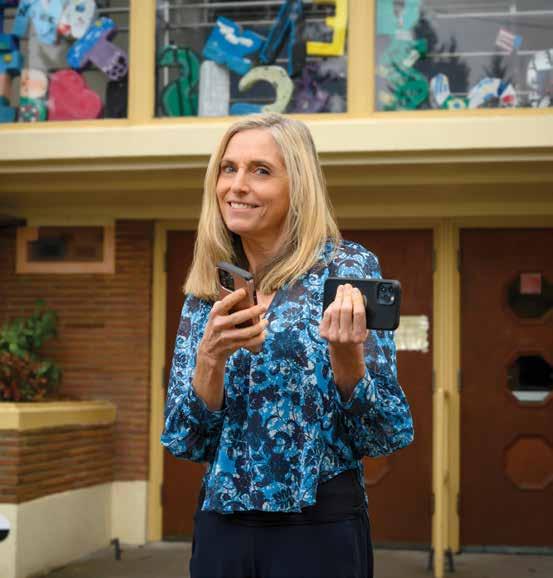 Delaney Ruston, M.D.
Delaney Ruston, M.D.
pick up their phones without much thought. When she served on the Battle Ground Public Schools’ board of directors (2013–17), she noticed similar behavior — “students walking around like zombies, staring at their phones.” Like Ruston, she’s concerned about the link between cell phone use and declining academic performance, specifically as it relates to state test scores.
McClintock’s concerns and discussions with school leaders in her district prompted her to sponsor HB 2018, restricting cell phone use in public schools, during the 2023–24 legislative session. Although the bill passed out of committee, it never got a hearing on the floor. Had it passed, the bill would have stipulated two years of research
piloting Away for the Day in area schools to determine best practices. The program, designed by Ruston and Tabb, equips parents, teachers and school leaders with the necessary tools to institute effective policies requiring phones to be put away. She has plans to reintroduce the bill next year. “It’s unhealthy for our kids, and we need to start looking at what’s best for these kids,” she explains.
Ruston reminds parents that they can visit the Away for the Day website and get information to take to their school administration to petition for change. “It is time that we do not put it upon our students to be able to resist all that pulls at them on their devices.”
What book or podcast are you recommending right now?
Ruston: I thoroughly enjoyed Frances Haugen’s book “The Power of One.” She was the whistleblower for Meta (formally Facebook), and her insights into the behind-the-scenes of that company and others have given me a lot of great information to discuss with my kids.
McClintock: Right now I’m trying to keep up with my legislative work and my regular day job! The last book I read was by Brené Brown.
How can parents teach children to repair a broken world?
Ruston: Remember that each time we organize small do-good events, this has a major impact on our kids’ sense of agency to make changes. For example, with my kids, we organized neighbors to Beautify Our Planet (BOP) with us on various occasions. We would have fun walking around and clearing up the neighborhood all together.
McClintock: Teaching kids to be compassionate and to have the ability to see other points of view are crucial. Parents have to model that and have those discussions with their kids.
What daily habit or routine is important to you?
Ruston: Connecting with people. That can be a call with my kids or striking up a conversation with a stranger at the pickleball court. Human connections are the anchor for my emotional well-being. When I am adrift, having a conversation with a dear person will help ground me back in goodness.
McClintock: I need my morning routine of my coffee and breakfast smoothie to get me going. I also need to get outside and take a walk daily to clear my head and get some fresh air. ■
— Allison Sutcliffe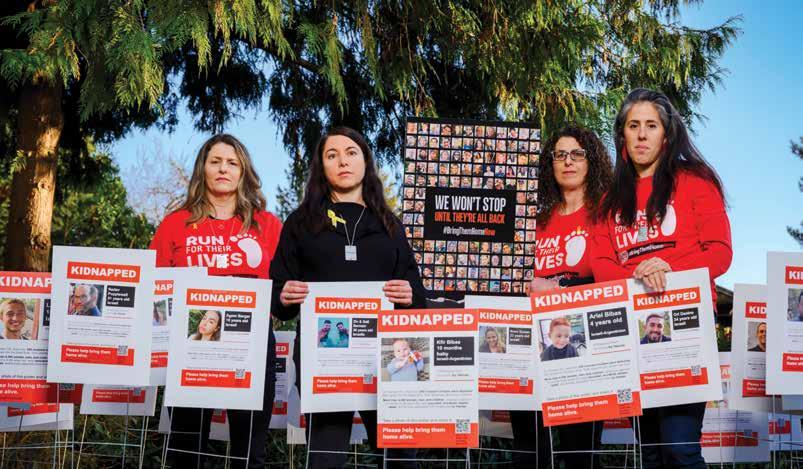
Four local Israeli women have emerged as passionate activists, dedicating themselves to raising awareness about the plight of hostages in Gaza since Oct. 7. Motivated by a shared sense of country, compassion and a drive for justice, they have embarked on a mission to shed light on the human rights violations occurring in the region. Their unwavering dedication serves as a powerful reminder of the strength and resilience of the human spirit in the pursuit of justice.
Iris Kalach
Iris Kalach, a passionate advocate for humanitarian causes, has found her calling in volunteer work, particularly through her involvement with Run for Their Lives, an
initiative dedicated to drawing attention to the release of hostages in Gaza.
When asked about her journey, Kalach recounts a pivotal moment: “I love physical activity, and after Oct. 7, I froze. I couldn’t move. I felt numb.” For Kalach, the motivation lies in raising awareness and preventing people from becoming desensitized to the realities of war.
Navigating the complexities of coordinating a volunteer effort can be challenging, but Kalach is undeterred. She acknowledges the diversity of opinions within the community she serves, emphasizing the need to listen and find common ground.
Despite the hurdles, progress and success are evident. About half of the hostages have been released, and Kalach believes their walk/run efforts helped make a difference. “We united the Israeli and Jewish community,” she proudly declares.
Dafnit Soffer, a prominent figure in Seattle’s Israeli community, exemplifies this spirit of resilience and social activism. Her journey into community engagement began during her tenure as the Israeli community relations manager at the Israeli-American Council in Seattle. However, it was the events following Oct. 7 that propelled her into a deeper commitment to social causes.
“For me, being socially active served as my therapy,” Soffer explains. Through her work, Soffer seeks to keep the issue alive in people’s minds, particularly the plight of the 134 hostages in Gaza.
Soffer’s approach to progress and success is simple yet powerful: engage more people every time. For Soffer, encouraging action means cultivating a collective consciousness that refuses to let important issues fade from daily life. It’s a call to action that resonates with the ethos of responsible citizenship and social accountability.
Ronit Bohrer Hillel
Witnessing the suffering of innocent hostages from around the world and the turmoil facing her homeland, Ronit Bohrer Hillel knew she couldn’t remain idle. Regardless of where she lives, Israel holds a special place in her heart, and this has compelled her to take action.
At the heart of Hillel’s mission is a simple yet powerful message: Bring them home now. She emphasizes the urgency of
freeing innocent people who have been unjustly taken from their homes. There is no defense for such heinous acts, and Hillel believes that it is imperative to prioritize the hostages’ safe return above all else.
To encourage action among ParentMap readers, Hillel urges them to reach out to their members of Congress and advocate for the release of the hostages from Hamas.
Osnat Zemer
For Osnat Zemer, an Israeli living abroad, the invasion of Israel hit close to home, igniting a fervent desire to take action.
The news of 240 hostages being seized by Hamas terrorists and held captive in Gaza struck Zemer to her core. Among the hostages was the grandson of a former colleague, a 17-year-old boy taken from his girlfriend’s home. The personal connection has intensified Zemer’s resolve to fight for
their release, knowing that behind each statistic is a human being with a story, a family and dreams for the future.
Her most significant endeavor has been comanaging a special delegation of families of hostages that visited Seattle and Olympia for an intense six-day program. Pouring her heart and soul into the project, Zemer juggled the demands of her volunteer work with the responsibilities of daily life, including caring for her own children. Despite the challenges, she has remained unwavering in her commitment to bringing attention to the hostages’ plight and advocating for their release.
What book or podcast are you recommending right now?
Zemer: “The Ezra Klein Show” is always insightful and fascinating, but since the war between Israel and Hamas started, he’s dedicated a few episodes for this, and I find his perspective interesting and helps to shed light on the complexity.
Hillel: Simon Sinek’s podcast “A Bit of Optimism” is a source of inspiration, highlighting the importance of maintaining hope and positivity in challenging times.
Soffer: I am listening to an Israeli podcast with Yael Poliakov that discusses the importance of maintaining positive thoughts even during bad times.
Kalach: I’m reading “Hidden Potential, The Science of Achieving Greater Things” by Adam Grant.
How can parents teach children to repair a broken world?
Zemer: By raising children who are aware of the world around them and unafraid
“Come walk with us. We are not really running; we are walking. We are not protesting; we walk to raise awareness to release the hostages back home.” — Iris Kalach
to speak out against injustice.
Hillel: I believe parents can shape a better world for future generations by instilling values of critical thinking and empathy in our children.
Soffer: In my view, my role is to mediate the world to my children in a somewhat better light than the complex reality might present, hoping my approach is the right one. I believe that children are capable of constructing a narrative that they can comprehend and manage, and it’s our duty to provide them with the tools to do so.
Zemer emphasizes the importance for ParentMap readers to understand the complexity of the conflict. It’s a call for empathy, for critical thinking, learning and for solidarity with those who suffer in the midst of the chaos of war. Encouraging readers to reach out to their elected representatives and engage in informed dialogue, Zemer underscores the power of collective action in effecting change.
Kalach: Every day, to do good things even if someone is mean to you. I believe what comes around goes around.
What daily habit or routine is important to you?
Zemer: Amidst the chaos, I find solace in the simple ritual of reading bedtime stories with my kids, a reminder of the magic that exists even in the darkest of times.
Hillel: I’m a devoted list-maker and start each day with a clear plan of action.
Soffer: I prioritize gratitude as a grounding force amidst the chaos of the world. Taking a moment to pause and express appreciation for the blessings in my life anchors me amidst the turbulence of the world.
Kalach: I say and show affection to my spouse, kids and family. Relationship is what energizes me and keeps me emotionally healthy. ■
— Alayne Sulkin
In the heart of Seattle’s urban landscape, three visionaries stand at the forefront of a movement to breathe new life into the city’s downtown core: AP Diaz, the steward of Seattle Parks and Recreation; Sara Nelson, Ph.D., the esteemed council president for Seattle City Council; and Jon Scholes, the driving force behind the Downtown Seattle Association. All share a common devotion to revitalizing the city’s most vibrant district.
Jon Scholes
Since childhood, Scholes has been captivated by the vibrancy of urban spaces, sparked by visits to iconic cities like Boston, New York City, Philadelphia and Washington, D.C. This early fascination with cities, coupled with a passion for public policy and community betterment, laid the foundation for his journey into civic leadership.
What drives him most in his role is the opportunity to effect positive change in one of the world’s premier urban hubs, despite the challenges Seattle faces, including complex issues such as homelessness and transportation. Patience, he admits, is the greatest challenge. Transforming a city requires time, persistence and collaboration.
For Scholes, success is defined by a downtown that is healthy, vibrant and inclusive. It’s a vision that requires optimism. He believes unwavering positivity is essential for navigating the complexities of urban revitalization. Scholes extends an invitation to ParentMap readers: “Come downtown!” He extols familiar family-friendly attractions, including
Seattle Center to Seattle Art Museum and the Museum of History & Industry, with a promise of even more excitement to come for families.
AP DiazFrom deputy city attorney for Los Angeles to the head of Seattle Parks and Recreation, Diaz’s trajectory into civic service took an unexpected turn.
After 24 years with the city of Los Angeles, Diaz planned a “brief stint” in public service, which evolved into a lifelong
For Diaz, the driving force behind his work lies in amplifying the perception of parks as essential infrastructure.
dedication. Transitioning from general counsel for the LA parks department to its executive officer, his love for parks flourished, laying the groundwork for his eventual call to serve in Seattle.
For Diaz, the driving force behind his work lies in amplifying the perception of parks as essential infrastructure. As superintendent/director of Seattle Parks and Recreation, he sees himself as both an advocate and a caretaker, tasked with advancing the department’s mission and stewarding Seattle’s cherished parkland.
He finds joy in embracing and understanding the unique perspectives of nature enthusiasts, athletes and environmentalists alike. For him, progress is marked by leaving an enduring, positive impact on the city and its inhabitants, a legacy that transcends generations.
With “Parks make life better” as his guiding principle, Diaz encourages ParentMap readers to engage with their local parks, share their visions for improvement and champion the invaluable role of public spaces in shaping the future of Seattle. In his vision, every park visitor plays a vital role in preserving and enhancing Seattle’s park spaces for generations to come.
Sara Nelson
Nelson’s journey from academia to civic leadership is a testament to her unwavering commitment to the betterment of Seattle’s communities.
In her role as president of Seattle City Council, Nelson is motivated by her deeprooted fascination with human behavior and power dynamics. Her academic background, which focused on the intersectionality of gender, race and class in public policy, continues to inform her legislative work.
For Nelson, progress and success are measured by the presence of families in Seattle’s public spaces, a key indicator of a city’s ability to function. Ensuring safe, clean and accessible amenities for residents, students, small-business owners and parents alike is her overarching goal. It’s a deeply personal mission for Nelson, who has experienced Seattle from various perspectives, including as a small-business owner, graduate student and parent.
Accountability serves as Nelson’s guiding touchstone, manifesting as a commitment to thorough legislative analysis, stakeholder consultation and continuous evaluation of outcomes. Encouraging ParentMap readers to engage with city hall, Nelson emphasizes the importance of their voices in shaping policies that impact families’ quality of life.
Nelson extends a heartfelt invitation to ParentMap readers: “Your voice is important. Email me at Sara.nelson@ seattle.gov as it’s crucial that we hear from you.” Nelson shares a vision of a safer, cleaner and more livable Seattle, alongside her fellow superheroes.
What book or podcast are you recommending right now?
Scholes: “How to Know a Person” by David Brooks because how we relate to each other is the most important, challenging and enriching endeavor in life.
Diaz: I recommend John Judge’s “The Outdoor Citizen: Get Out, Give Back, Get Active” as an inspirational and a callto-action read about our environment and the responsibilities we all share in being good nature citizens.
How can parents teach children to repair a broken world?
Scholes: Demonstrate optimism and always hold hope. Teach your children to learn, grow or find something to appreciate in every experience and encounter, no matter how challenging.
Diaz: To watch and observe the resilience in nature and the environment. Our planet faces incredible stresses, devastation and natural erosion each and every day, but also shows up every day in inspiring sunrises and sunsets, blossoming flora and fauna, and oceans filled with life and calling for exploration.
What daily habit or routine is important to you?
Scholes: A walk with music in my ears, either downtown or in the mountains. It’s a time to relax, reflect, think and breathe in fresh air.
Diaz: Sharing at least one compliment with another person, giving at least one smile, and doing at least one “kitchen dance” — which also makes life better!
Nelson: Having dinner at the table with my family if I’m not at some event (which I often am). Second most important is getting up really early to drink coffee and read the news. ■
— Alayne SulkinBlacks, Jews and Muslims share a history of overcoming adversity. Despite the drifting apart of these people over the years, rising antisemitism has called for renewed unity inspiring local Black, Jewish and Muslim leaders to join forces with renewed vigor, led by Rabbi J. Rosenbaum, Mercer Island Mayor Salim Nice, the Rev. Linda Smith and Bishop Garry Tyson.
Rabbi J. Rosenbaum
From a very early age, Rabbi J. Rosenbaum understood a profound aspect of Torah study: the challenge of discovering new insights within familiar texts. The philosophy of connecting seemingly disparate ideas guided his interactions, with him coming to believe that, just as unexpected connections could be found in Torah study, so too could they be discovered between people seemingly unable to be reconciled.
Rabbi J. Rosenbaum has worked tirelessly for over six years repairing seemingly irreconcilable relations between the Muslim, Black and Jewish communities. He shared a recent encounter with a young Muslim woman that exemplified this situation. Rosenbaum was taken aback when the young woman expressed, “I can really understand why the Jewish people would want their own state. As a Muslim, I can see the difference between being in a Muslim country and being a minority in another country.” Rosenbaum reflects, “You never know when that door is going to open, and exceed your expectations or you’ll exceed theirs.”
Together with Mark R. Jones, Ph.D., Rosenbaum cofounded Building Black and Jewish Beloved Community, using developed strategies to create coalitions between cultural groups, such as Black and Jewish communities, and immigrant and native populations. Their partnership exemplifies Rosenbaum’s belief in being open to unexpected connections and
continually seeking ways for people to come together.
In the tranquil landscape of Mercer Island, Nice stands as a guardian of unity and resilience.
In the face of horrific acts of antisemitism Nice stood firm in his advocacy for Mercer Island’s Jewish residents. He and Deputy
Central to Smith’s mission is dispelling false assumptions and perceptions, and promoting a message of justice, peace and unity.
Mayor Dave Rosenbaum (son of superhero J. Rosenbaum) stood together to call on the community to support Jewish neighbors, emphasizing the importance of maintaining unity and safety for everyone.
Nice, the first Ismaili mayor in the U.S., offers simple yet profound advice: Ask questions. In a world fraught with division and discord, he believes that understanding is the key to building bridges, fostering compromise and, ultimately, creating a better world.
Rev. Linda Smith
Inspired by the impactful racial justice work of Rabbi Abraham Joshua Heschel and King, the Rev. Linda Smith embarked on a journey to delve deeper into the Jewish community’s plight. Smith is
motivated by the belief that every person deserves to live free from fear, and her work is fueled by a passion for justice.
Embracing theological differences, Smith finds common ground around the table, where conversations of justice and love flourish. Central to Smith’s mission is dispelling false assumptions and perceptions. She envisions progress and success as communities validating each other’s humanity, honoring individual authenticity, and standing together against racism and antisemitism.
With hope and justice as her guiding touchstones, Smith continues to inspire and empower others to join her in the noble pursuit of building bridges of understanding and love in a world too often divided by fear.
Bishop Garry L. Tyson
Inspired by King’s call for positive peace and social justice, Goodwill Baptist Bishop Garry Tyson embarked on a mission to cultivate unity and dialogue across religious lines. Motivated by the biblical promise of blessings in unity (Psalms 133:3), Tyson tirelessly fosters an environment of harmony, believing it to be his divine calling as a Baptist minister.
His hope is simple yet profound: that people understand the transformative power of coming together in sacred spaces, transcending religious divides. The irony of his church’s history, purchasing land from a Jewish synagogue only to later host Jewish rabbis, fills him with hope for a future marked by inclusivity.
For Tyson, progress is measured in the growing participation of African American pastors and congregants in the movement toward unity. Unity at this time means standing up to combat antisemitism with our Jewish brothers and sisters. His guiding principle: mission — nothing more, nothing less.
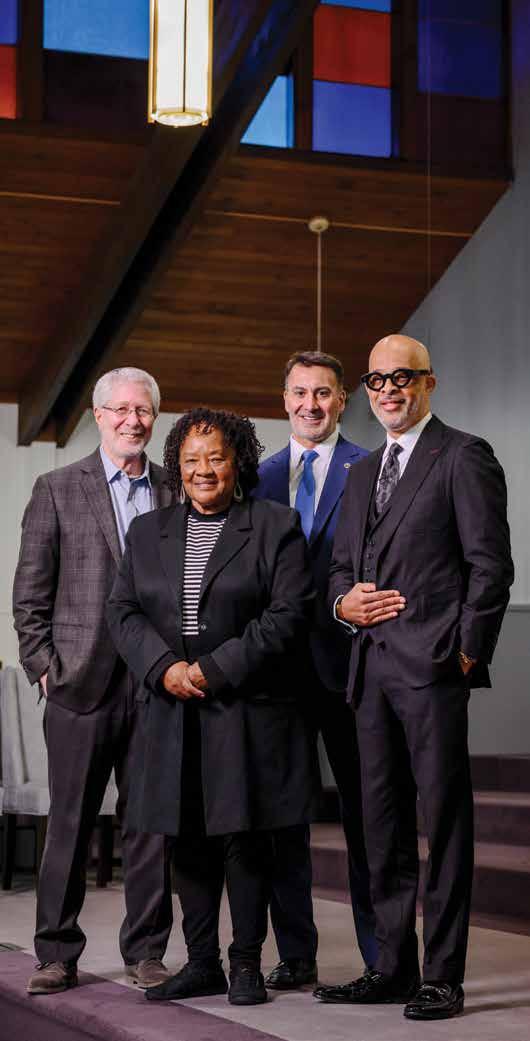
What book or podcast are you recommending right now?
Nice: I highly recommend “Incredible Years: A Trouble-Shooting Guide for Parents of Children Aged 2–8 Years” by Carolyn Webster-Stratton. It’s been instrumental in guiding my journey as a parent since my son was 3.
Smith: “Bridges to Heal US: Stories and Strategies for Racial Healing” by Erin Jones, “Justice: What’s the Right Thing to Do?” by Michael Sandel,
Rosenbaum: “The Righteous Mind: Why Good People Are Divided by Politics and Religion” by Jonathan Haidt.
Tyson: I’m presently reading “The PostQuarantine Church: Six Urgent Challenges and Opportunities That Will Determine the Future of Your Congregation” by Thom S. Rainer.
How can parents teach children to repair a broken world?
Nice: By engaging with residents daily, attending community events and collaborating with diverse groups like our Jewish neighbors, we can model the values of compassion and unity.
Smith: Parents can model healthy relationships, exposing kids to groups other than themselves, having open dialogue about issues and helping them to understand love.
Rosenbaum: Encourage more respectful conversations across differences, motivated by curiosity, not victory.
Tyson: First, we should teach them how to accept criticism. Second, teaching them how to manage disappointment is imperative. Thirdly, teach them how to live life with compassion towards others.
What daily habit or routine is important to you?
Nice: Setting three achievable goals for the day grounds me and propels me into action.
Smith: Gratitude. Being grateful for who I am and finding something to be grateful for in someone that is different from myself.
Rosenbaum: Daily prayer.
Tyson: For me, it’s my time of devotion and meditation. Every day starts better with prayer. ■
— Alayne SulkinOriginally from Zimbabwe, Ken and Ranga Chikonzo had only lived in the U.S. for a few years when they lost their oldest daughter, Laura, to cancer in 2021. But the local community rallied around them to support them through their pain. To honor Laura’s memory, the couple formed Ubuntu Nerudo, an organization that pays forward the care and support they received. In the Shona language of Zimbabwe, ubuntu means “together” and nerudo means “with love.” Together with their niece Mwa Hungwe, they are building a loving community through the preservation and celebration of African heritage.
At the heart of Ubuntu Nerudo is the belief that “I am because we are.” Hungwe explains, “That is the essence of human beings. As much as we are different, we are strong together.”
Focused on the local Zimbabwean community, a group of more than 200 people keep in touch on WhatsApp. Posts to the group reveal individual and community needs. Whether that’s support in the immediate aftermath of a family member’s death, information about how to access health care or social connection for international students, the Ubuntu Nerudo community steps in to fill the gaps.
Noticing the prevalence of health problems like diabetes, group members began promoting healthy eating through traditional foods. The Chikonzos owned a small farm in Zimbabwe and understand the importance of culturally relevant foods to a healthy diet. Last year, they launched a partnership with Black Farmers Collective to grow culturally relevant foods. Beyond the growing season, “Rhythm and Flavor” events give people a chance to connect with one another as they sample traditional foods, which are hard to find
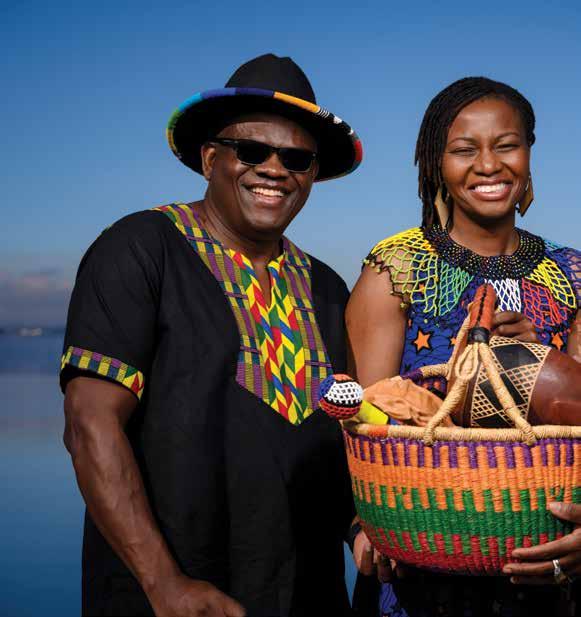
locally, and experience traditional music.
Ubuntu Nerudo connects parents with local musicians who teach children to play marimba and mbira, and with resources to learn some of the 16 official indigenous languages of Zimbabwe, including Shona, Swahili and Ndebele.
“Now we have children in our community who were born in America who are able to understand our language,” enthuses Ranga. One of them is Hungwe’s 5-yearold son, who learns Shona online with classmates from around the country.
A former banker, Ken noticed something else that needed to be addressed:
Teens in the community who are coming of age in America don’t receive a financial education. Ubuntu Nerudo’s next community event will be a financial education workshop for teens. The founders’ dreams for Ubuntu Nerudo are as big as their dreams for the young people in the community. They hope to lead a travel group to Africa next year to show people firsthand that Africa is not like what people see on TV. And eventually, they hope to build a community center modeled after African villages, where they can host festivals and a community garden to provide space for people of African descent to grow their own culturally relevant foods.
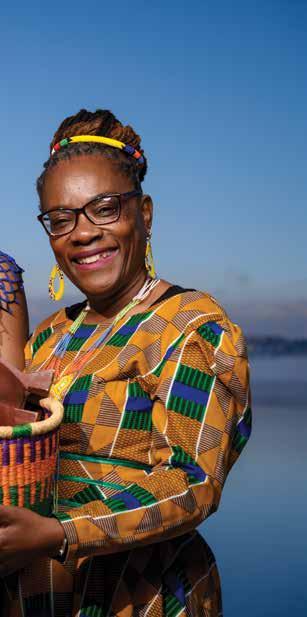
What book or podcast are you recommending right now?
Ken Chikonzo: “The Body Keeps the Score” by
Bessel van der KolkPart of my work is as a chaplain at Harborview Medical Center. People there are experiencing probably the worst state of their lives, and recognizing that we can safely assume each and every person has suffered some sort of trauma in their life has given me a fresh perspective to be patient with people, to try to understand their worldview and why they behave in the way they do.
Ranga Chikonzo: “Building People, Building Dreams” by
Tom DeuschleTom Deuschle is an American who relocated to Zimbabwe 40 years ago, and he has really done a lot of work in Zimbabwe. He has impacted both of us because he was our pastor in Zimbabwe. He teaches to build others, to build people’s dreams. It’s a very powerful book.
Hungwe: “Shepherding a Child’s Heart” by Tedd Tripp
My husband and I talk about how we don’t want to mess this [parenting] up. We want him [their son] to be a responsible citizen, to add value to this world and we do not want to be the reason that he doesn’t. My neighbor has amazing kids, and she recommended that book. It was helpful and practical.
How can parents teach children to repair a broken world?
Ranga Chikonzo: By not telling them to do things, but by doing them. Not telling them to love, but by being genuine and loving with people. Be there for people because kids are not what we tell them to be, they are what we are. I think we should also encourage parents to meet their kids where they are, and if you have more than one child, not to compare the children, because each child is different. Accept our kids for who they are and encourage them — especially in their failure. It’s easy to love your child when they are doing so well, but when they are failing, just be there and encourage them to look at the lessons to learn.
Ken Chikonzo: We need to teach tolerance, we need to teach acceptance. We need to teach unity in diversity, and we need to teach children that it’s okay to be different. Differences do not have to cause us not to love one another.
Hungwe: I feel so honored to even be asked that question. Do I even know what to do? What I have been trying to do is talk to [her son] like he’s a human being. One of the things we did not have growing up was that voice — you do not talk back to your elders! — which I really had to unlearn, because it became such an impediment. So I tell my
son all the time, ‘Your voice has so much power. You want to use your voice.’ I try not to get mad and to take a step back and say, ‘Mommy’s upset, do you understand why?’ and ‘If you disagree, tell me, and we can talk about why.’ And we get into some real conversations. But he’s very aware that there are consequences — we have to keep that balance.
“Material things are good to have. But the best things to have in life are relationships, because you can depend on other people when your own strength is failing.” — Ken Chikonzo
What daily habit or routine is important to you?
Ranga Chikonzo: Walking. I find so much peace in nature. It gives me joy.
Ken Chikonzo: Reading my Bible and reflecting or meditating. It helps to keep me grounded and centered. I like to take that time in the morning to just be alone with God.
Hungwe: Waking up early. I get to do a lot because I wake up early. I wake up at 3 o’clock, do my meditation and prayer and my workout, and go to work at 5. I’m done by 1, and that opens up my day to volunteer at school or do my own stuff. That schedule has been life-changing for me. It’s helped me stay consistent because the morning is quiet. Sometimes you go to work, you have a bad day and you’re like, ‘I’m not going to work out.’ I do sleep in on Saturday; I wake up at 6, but it has to be early enough to do my routine. ■
— Gemma Alexander
More Superheroes continued on page 32



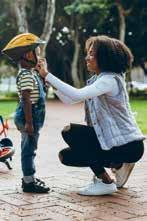










Our entire nation is experiencing a youth mental health crisis. Families looking for help for their kids often have a very difficult time finding it. This is where Washington’s Mental Health Referral Service for Children and Teens can help. It connects families with mental health and behavioral health providers in your community who accept new patients, work with your insurance and are a good match for your child’s treatment needs.
Operated by Seattle Children’s and funded by Washington Healthcare Authority, the Referral Service:
• Is free.
• Serves all of Washington state.
• Provides specific and thorough referrals for kids ages 17 and younger.
• Allows teens ages 13 to 17 to find providers for themselves by calling the Referral Service directly.
• Is committed to serving families as quickly as possible.
The Referral Service helps families with a wide range of needs, including:
• Individual therapy.
• Medication management/psychiatric referrals.
• Parent training.
• Diagnostic evaluation (discovering and pinpointing the issues and conditions a child or teen may be dealing with).
By the end of 2023, 12,829 families had received help from this free resource to find mental and behavioral health services in their communities. In a survey of 1,182 families who used the Referral Service, nearly all said that it met their needs and that they would recommend it to other families.

Mollie Shirman, the Referral Service’s business operations manager, explains, “Accessing mental health care for your child can be difficult. Washington’s Mental Health Referral Service has a database of over 4,900 mental health providers that we update each day. Our program can help you navigate what your child needs and find appropriate referrals. You are not alone!”
To get started using the Referral Service:
• Call 833-303-5437 Monday to Friday, 8 a.m. to 5 p.m. Pacific time.
OR
• Complete an online request at seattlechildrens.org/clinics/washingtonmental-health-referral-service/referralform.
Approximately 2 weeks after their intake, families receive information for 1 or 2 recommended providers who are a good match for their child’s individual needs.
Need Interpreter Services?
To call the program using an interpreter, first call 1-866-583-1527. Listen for your preferred language and select the number provided. You will be placed on a brief hold while an interpreter is selected. Once an interpreter is on the line, ask them to call the program directly at 1-833-303-5437.
SCAN

When a child suddenly has 3 or more very loose or watery stools (poops) in a day, they have diarrhea. Usually caused by a virus, diarrhea often goes away on its own within a day or 2. For mild diarrhea (when there are 3 to 5 watery stools a day) a child can continue their regular eating and drinking. This includes human breast milk, formula and cow’s milk. The main risk of diarrhea is dehydration, so offer extra fluids to keep your child hydrated. Water and products like Pedialyte that are formulated to replenish fluids and electrolytes are helpful. Watered down 100% fruit juice and broths are other options. Avoid sodas and full-strength sports drinks, which have high amounts of added sugars, and may worsen diarrhea. For babies younger than 1 month with diarrhea, call their doctor right away to get care. Scan the QR code below to learn more about treating mild, moderate or severe diarrhea, including when to call a doctor or get immediate medical care.
SCAN TO LEARN MORE
While vape devices can be used for marijuana, this article focuses on electronic cigarettes that contain nicotine.
Parents and caregivers can help ensure that tweens and teens never develop the e-cig habit. Be sure you understand the health risks of vaping with electronic cigarettes, so you can tune in to your child’s behaviors and feel confident talking with them.
While traditional cigarette smoking among tweens and teens has decreased in recent years, vaping has increased dramatically. E-cigs can be legally sold only to those age 21 or older, but kids still manage to get them. These devices heat a liquid containing nicotine, flavorings and chemicals to produce an aerosol or vapor that’s inhaled. E-cigs can look like regular cigarettes, or they can resemble pens or USB flash drives — all of which are small and easy to hide.
The most essential thing to know about vaping is that it’s very dangerous. Many kids try it because they falsely believe e-cigs are non-addictive and harmless. In fact, most e-cigarettes contain nicotine, which is highly addictive. Nicotine can cause both physical and mental problems relating to attention, learning and memory. Also, e-cigs can contain toxic chemicals like formaldehyde plus metal particles such as nickel, lead, chromium, tin and aluminum — which can cause permanent lung damage.
Parents can and do influence kids’ choices! Talk with them about the dangers of vaping and e-cigs today.
SCAN TO LEARN MORE

There are times when we as parents need to take a pause before speaking, especially when we’re feeling frustrated. We can take a deep breath and choose our words carefully. Taking a moment to calm ourselves and think things through allows us to respond with love and compassion. That way, we can avoid saying something that is hurtful or that we’ll regret. As we pause, we can take a few relaxing breaths, picture a calm scene in our mind, and even step away for just a moment if we need to.
It’s easy to forget to take a pause. If we do say something to our child that’s harsh, we should apologize. We can simply name the feeling we had and tell them we regret our behavior. Something like: “I’m feeling rushed and worried we’ll be late getting you to school. I’m very sorry I snapped at you.” By apologizing, we’re modeling an important life skill!
TO LEARN MORE


Life jackets save lives, and a correct fit is crucial. The right fit is based on a child’s current size and weight: too big and the jacket can push up around a child’s face, too small and it may not keep their body afloat. Test the fit by putting the life jacket on your child, ensuring the straps are snug. Have your child stand with their arms at their sides. Grab the shoulders of the life jacket and lift straight up. If it moves more than 3 inches up or above the child’s ears, it’s not a safe fit. And remember that life jackets for younger children must have both a collar for head support and a snug strap between the legs.

Families thrive on healthy habits and routines. Having a regular snack schedule for your child is a smart practice. For most kids, 3 meals plus 2 snacks a day is a healthy way to go. This fuels them with the nutrients they need to think, learn, grow and play. Offering regular meals plus small healthy snacks also helps a child discover how much food their body really needs.
If possible, give snacks at a regular eating spot like the kitchen table or a counter. When the weather allows, it’s fun to eat outside on a patio table or picnic table. Or enjoy a ‘tailgate’ snack in the car after playing at your favorite park. Wherever the location, make the food (along with some friendly conversation!) the focus.

Create well-balanced snacks by choosing items from 2 or 3 different food groups, including fruits and vegetables. For example, berries, yogurt and nuts provide a fruit, dairy and protein. Carrots, string cheese and whole-wheat crackers provide a vegetable, dairy and whole grains. Offer a wide variety of foods so your child learns to try new tastes. And invite them to choose and help prepare the snack with you.
Whenever possible, avoid snacks that are seen as ‘treats’ such as foods that are too sugary or salty or that offer empty calories. A snack should serve as a mini meal by satisfying hunger, but it should not cause a child to fill up so much that they don’t want to eat at meal time.
Avoid snacking while watching screens, as this can lead to automatic or unconscious eating. Being fully aware of what they’re eating allows a child to feel their body’s cues that tell them whether they’re hungry or full. This ability to tune in to their body is a crucial skill that will serve them their entire lives.
Scan QR Code
Sign up today to receive our free eNews 6 times a year!
Please check our website for the latest information. Scholarships are available. If you would like to ask about a scholarship, use the contact information for the class you’re interested in to connect with the registrar.
Autism 101
Watch the lecture, in English or Spanish, at seattlechildrens.org/autism101.
Conversations About Autism
Learn more or view past sessions at seattlechildrens.org/ conversationsaboutautism.
Babysafe
Learn more, view dates and register at seattlechildrens.org/classes.
Finding Mental Health Care in Washington
State: A Class on Where to Start
This class is available in English and Spanish. Learn more, watch a recording, view dates and register at seattlechildrens.org/classes.
First Approach Skills Training: Behavior Basics
Learn more about this on-demand, self-paced class for parents and caregivers of children ages 5 to 12 with disruptive behaviors at seattlechildrens.org/classes.
Staying Close While Standing Back: The Art and Science of Parenting Adolescents
Learn more, view dates and register at seattlechildrens.org/classes.
Your Child With Disabilities Is Turning 18
Learn more and watch the class in English, Spanish or Vietnamese at seattlechildrens. org/classes.
Youth Mental Health First Aid
Funded by the King County MIDD Behavioral Health Sales Tax, supporting behavioral health and recovery. Learn more, view dates and register at seattlechildrens.org/classes.
Better Babysitters
Choose virtual or in-person class. Learn more, view dates and register at seattlechildrens.org/ classes.
The Chat Workshop Series (Is Puberty Weird?; Body Basics; More Body Basics; Crushes, Consent, and Other Conversations; Our Sexual Selves)
Learn more, view dates and register at seattlechildrens.org/classes. See a trailer for The Chat at greatconversations.com.
Sibshops for Siblings of Children With Special Health and Developmental Needs
Learn more, view dates and register at seattlechildrens.org/classes.
Free Car-Seat Checks
Weekly on Tuesdays in Bellevue; Saturday, April 27 and Saturday, June 8 in Seattle
Learn how to safely secure your child in the car. Child-passenger safety experts will check your child in a car seat, booster seat or the seat belt and answer any questions you may have. Car-seat checks are by appointment only. Learn more and register for an appointment at seattlechildrens.org/carseatchecks.
Free Virtual Car-Seat Checks
King County Certified Child-Passenger Safety Technicians are offering free virtual car-seat check appointments via video-chat platforms. For more information, email Laura Miccile at laura.miccile@kingcounty.gov or call 206-477-8664.
South County Fire and Safe Kids Snohomish County offer free virtual car-seat classes. Registration is required. Visit southsnofire.org/ community-programs/classes/car-seats.
Free Education and Safety Device Events
Safe Firearm Storage Event in Jefferson County
Saturday, April 6, 10 a.m. to 2 p.m.
Chimacum Grange, 9572 Rhody Dr., Chimacum Jefferson County Public Health, in partnership with Seattle Children’s, Community Health Plan of Washington and Jefferson Healthcare, invites the community to learn about the importance of safe firearm storage, receive a free lock box or trigger box, and get trained on how to properly use them. Children are welcome at the event, and for those 18 and up, we will offer one free device per person. Learn more at seattlechildrens.org/ firearmsafety.
Community Water Safety Event With Seattle
Children’s Autism Center
Saturday, May 4, 11 a.m. to 2 p.m.
Seattle Children’s Autism Center, 6901 Sand Point Way NE, Seattle
Join us for National Water Safety Month and learn about ways to stay safe in and around the water. Children and teens can be fitted to receive a free life jacket. This event is designed for young people with autism and their families but all are welcome.

About Good Growing
Heather Cooper is the Editor of Good Growing, which is produced four times a year by the Marketing Communications Department of Seattle Children’s. You can find Good Growing in the January, April, July and October issues of ParentMap and on our website seattlechildrens.org. For permission to reprint articles for noncommercial purposes or to receive Good Growing in an alternate format, call 206-987-5323. The inclusion of any resource or website does not imply endorsement. Your child’s needs are unique. Before you act or rely upon information, please talk with your child’s healthcare provider.
© 2024 Seattle Children’s, Seattle, Wash.
Regional Clinic Locations
Bellevue
Everett
Federal Way
Olympia Tri-Cities
Wenatchee
Primary Care Clinic
Odessa Brown Children’s Clinic
Hospital Numbers
206-987-2000
866-987-2000 (toll-free)
Online Resources
Visit seattlechildrens.org for:
Child health advice
Good Growing newsletter
Doctor Finder
On the Pulse and The Autism Blog
Medical condition information
Health and safety information
Ways to help Seattle Children’s Research Institute information
Find us online






continued from page 25
A similar thread runs through the personal stories of Rainier Athletes executive director and founder Jesse Franklin and director of operations Jacob Tobis. After graduating from high school, both found conventional success. Franklin played college football, then traveled the world teaching English and eventually landed a corporate consulting gig. Tobis took postbaccalaureate premed classes and had his sights set on becoming a family doctor. Yet, as predictable as their futures seemed, life had different plans.
In 2012, a candid conversation with some old friends from high school caused Franklin to change his career trajectory. For Tobis, volunteering to help an Odle Middle School sixth-grader study for and do well on a vocabulary quiz changed his. In fact, it was this volunteer opportunity through Rainier Athletes that connected the two men in the first place.
Launched in 2013, Rainier Athletes is an Eastside nonprofit program that empowers Bellevue youth, through a sports mentorship model, to close the opportunity gap. Working closely with the Bellevue School District and other strategic partners, such as Seattle Seahawks and the Boys & Girls Clubs, the program selects fourth- and fifth-grade students to participate in the program, which provides sponsorship for year-round sports through high school graduation.
But Rainier Athletes is so much more than a sports program. As Frankln explains, “Sports and activities are simply the way in which we engage a young person and their entire core community.” They are “One team.” One of the organization’s three values, this mantra embodies the idea that “together, we are stronger,” says Tobis. “The power of the Rainier Athletes community mentoring model [is that it] authentically
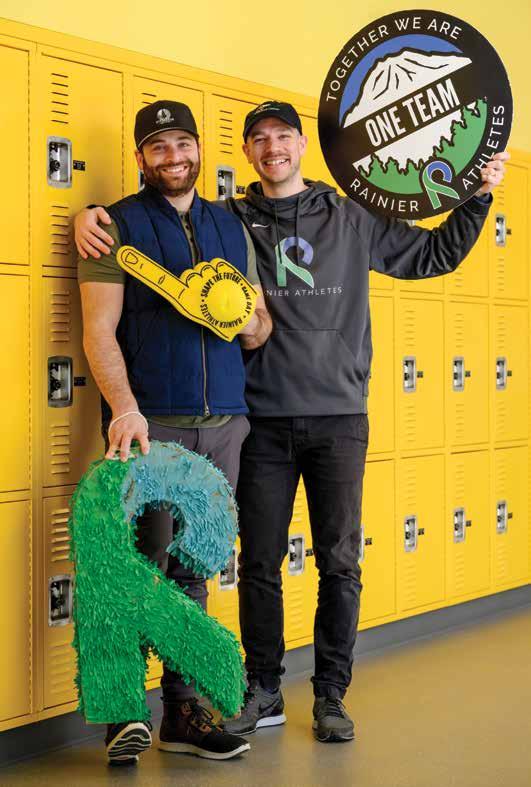
connects with the student’s core community of teachers, coaches and family members to build a network of support, so each student feels a deeper sense of belonging, whether they are at home, in the classroom, on the field or throughout the community,” he continues.
Since its first year, Rainier Athletes has expanded from serving three students from one Bellevue school to serving more than 100 students and their families across 11 schools within the district, according to Franklin. That’s
While Rainier Athletes’ student participants and volunteer mentors see the payoff on the field, they also see it in the classroom, which is one of the program’s main goals.
impressive, considering that Rainier Athletes commits to each student and their family for the long term — adding up to a minimum of nine years of consistent, ongoing and dedicated support. But, as Franklin points out, that’s what it takes to grow a community.
While Rainier Athletes’ student participants and volunteer mentors see the payoff on the field, they also see it in the classroom, which is one of the program’s main goals. According to Franklin, the “team of over 70 dedicated mentors engage in weekly communication with over 300 educators throughout the district in order to support each educator in forming strong connections with some of their hardest-to-reach students.” The result: Ninety percent of teachers agree that student participation in Rainier Athletes has “directly led to increased performance in classrooms.”
Looking back over the past decade, Franklin takes pride in the organization’s accomplishments. “Rainier Athletes started as a simple idea to cover the costs of sports for kids who couldn’t afford to participate. Today, as a result of this idea, we’ve built a connected community composed of over 1,000 individual stakeholders, who all work together as one team to further our collective mission.”
What book or podcast are you recommending right now?
Tobis: I recently finished “Oh Crap! Potty Training” by Jamie Glowacki, and after a grueling long weekend and a painstaking past few months, [am] happy to share that my almost 3-year-old is (sort of) potty trained! The book really had some good tips and framework, and was pretty entertaining.
I also recently read “Factfulness” by Hans Rosling, Ola Rosling and Anna Rosling Rönnlund. The authors believe that the world is better than we think, but I appreciated how they presented data, narratives and information, and then encouraged the reader to come to their own conclusions about the world. I also loved the point that things can be getting better and still be really challenging, and doesn’t negate the real struggles of individuals across the world.
Franklin: “SmartLess” [podcast]. It makes me laugh and step back from my to-do list.
How can parents teach children to repair a broken world?
Tobis: I think the key is in the modeling. I have two young kids now and directly see them modeling my actions and behaviors. I think especially modeling and giving space for patience, grace and understanding is key when things feel broken. And then at Rainier Athletes, I’ve seen that leading with genuine interest in the other person, rather than trying to jump to a conclusion or get a specific response, allows for deeper connections and
willingness to engage when challenges and hopelessness arise.
Franklin: Well, I try to teach my 2.5-year-old that bad guys, monsters and mean trucks just need love like anyone else. That they might be scared, too, when they first see you. The most brave thing to do isn’t to fight or run, but to listen, learn, see them and offer your love. And sometimes a kiss on the nose will turn the “bad guy” into a good guy. So parents need to do the work to unlearn their learnings of us versus them, good and bad, right and wrong; embrace a lifelong learning perspective; and fail in front of your kids and then own it. They don’t need perfect leaders or lessons. We all know those don’t exist. Model what it looks like to embrace our own and others’ imperfections.
What daily habit or routine is important to you?
Tobis: I love the daily car rides with my kids, dropping off and picking up from day care. Yes, there are plenty of times where crying and yelling are the entirety of the trip, but then there are some filled with noticing new things in nature, harmonizing a song, or my almost 3-year-old trying to get my 9-month-old to laugh!
Franklin: I get up before everyone, even if just for 15 minutes, and try to experience a slow start to the day. Slowly drink a full glass of water. Slowly stretch. Meander. Pause. ■
— Allison SutcliffeAs a parent, few things are more terrifying than the thought of your child being diagnosed with a serious disease. For many families, in addition to the fear and stress of diagnosis and treatment, finding affordable housing close to the hospital and maintaining some sort of normalcy for their family are monumental challenges.
Two of our superheroes, JJ Kissinger and Molly Landreth, run organizations that support families during that unthinkable crisis. Led by courage and the belief that joy and connection make a brighter way for us all, Kissinger and Landreth provide light to families who too often feel swallowed by darkness.
“We carry the burdens together, we experience the joy together. When each of us brings whatever light we’re managing to hold, a brighter way is made for us all.”
— JJ Kissinger
Founded by Kissinger, The Light Collective has a mission “to create a hope-oriented community where families who have a child with cancer can build resilience and share delight.” Through monthly at-home events, known as Matchbox Day, families receive a family meal (delivered to their
home) and a box containing games and activities.
Home Together, founded by Landreth, is a nonprofit creating affordable housing for low- to moderate-income families that must relocate to Seattle to access treatment at Seattle Children’s Hospital. Home Together rents homes that are cozy, furnished and pet-friendly, and with kitchens that are stocked with basics when families arrive.
Both Kissinger and Landreth are committed to supporting families, and they value connection and community. For families dealing with childhood cancer, community can be hard to find. “Ask any parent who has a child with cancer about their experience, and they will absolutely use words like ‘isolating’ and ‘lonely’ (alongside ‘terrifying,’ ‘disorienting’ and ‘devastating on every level’),” says Kissinger. “If we can help families remember they are not alone — if we can show up as a community of strangers who are committed to their joy and flourishing, and also create opportunities for these families to make meaningful connections with one another — I think we’ve accomplished something significant.”
“These families are going through the hardest emotional and financial challenge they will likely ever face,” says Landreth. “To offer them a little slice of comfort, community and normalcy in the midst of it is incredible, and to the families, it is an absolute game changer.”
Landreth’s and Kissinger’s work is rooted in the belief that each family is unique and deserves support and resources tailored to their needs. Families dealing with a
medical crisis need time to connect, to feel joy and leave stress behind, even if only for a day.
In a field that can weigh heavy, Kissinger and Landreth take time to celebrate successes. Molly is proud that Home Together has been able to furnish and subsidize rent on eight homes, providing housing for 25 families, over the past two years. Although there is currently a waiting list (a reflection of the need in the community), Landreth looks forward to the day they can provide housing to every family that needs it. For Kissinger, success looks like families meeting through his organization and then continuing their relationship on their own, finding community and strength through shared experience, and no longer walking the challenging path alone.

It’s no surprise that Kissinger and Landreth encourage everyone to get involved with their community. “I’d encourage people to find something that matters to them locally and volunteer!” says Landreth.
Kissinger agrees that volunteers make a huge difference. He also encourages people “to show up for the people in your life who are struggling. Drop off a lasagna or a big box of cookies. Write a note to let them know they’re on your mind. No one should suffer alone.”

What book or podcast are you recommending right now?
Kissinger: “Everything Happens” podcast by Kate Bowler. She has lived through her own horrific cancer story and speaks with honesty and humor about suffering and success and all the ways we pretend we can “fix” our lives. Her motto is: “Life is so beautiful. Life is so hard.”
Landreth: The podcast “We Can Do Hard Things.” They find the best guests who can tackle big ideas around mental health, well being, relationships and family, and do so with huge hearts and a great sense of humor. I also love Julia Louis-Dreyfus’ “Wiser
Than Me” podcast. I’m always inspired and love that she calls her mom at the end of each episode!
How can parents teach children to repair a broken world?
Kissinger: Whatever brokenness we face in this forever-fracturing world where we live, there is real power in hunkering down into daily rituals of turning toward one another and practicing joy and rest together. People often say that hurt people hurt people. It must also be true that loved people love people.
Landreth: Lead with love.
What daily habit or routine is important to you?
Kissinger: I know it’s all the rage to say “cold plunging,” but I’m with Olaf — I like warm hugs! If I don’t have a big old hug with each person in my family, the day just feels off.
Landreth: Talking to my son at night before we go to sleep about what we feel grateful for, or the highs and lows of our days. It opens up sweet and often surprising conversations and creates a space for meaningful connection each night. ■
— Kari HansonGrowing up in a large extended family that welcomed adoptive and foster children, Ellen Young says witnessing her family’s generosity and commitment to helping others fueled her passion for making a difference in others’ lives.
The thought of a child experiencing pain or hardship drives her in her work with Ruby Room, a nonprofit that provides free formalwear and accessories to underprivileged teens.
Clothing is more than just fabric, Young says, explaining that it’s a powerful tool for self-expression and empowerment. Young has seen firsthand how a well-fitted outfit or a stylish accessory can transform a person’s demeanor and instill in them a newfound sense of confidence and self-worth.
“These young individuals often struggle with issues related to self-esteem while recovering from trauma and neglect. It was this realization that inspired me to establish initiatives that not

only catered to their needs but also aimed at boosting their confidence through fashion, addressing their emotional well-being effectively,” she says.
Clothing is more than just fabric — it’s a powerful tool for selfexpression and empowerment.
Young has overseen Ruby Room since 2016 and today serves as chair of its nine-person board. In her time with Ruby Room, Young has spearheaded Ruby Room’s signature Fashion Workshop program, RubyRox Box care packages and the Holiday Giving program. She led the expansion of programs to include provisions of male formal attire, a quinceañera dress program and a cosmetics bar for clients.
While she’s incredibly proud of Ruby Room’s accomplishments, she’s always striving for more. Her vision of success foresees an expansion model by which Ruby Room can grow into a statewide program and continue across the nation to serve young people and families in local communities.
“Access is the greatest barrier our clients face in benefiting from Ruby Room programs, and increasing the number of physical locations throughout the highest-need regions would really change the game for Ruby Room, but, most importantly, the kids,” she says.
Young says community members can get involved with Ruby Room by joining the board or taking leadership opportunities as well as expanding its network of resources in the fashion, tech, finance and real estate industries.
What book or podcast are you recommending right now?
“Think Again” by Adam Grant — an insightful exploration of rethinking assumptions and embracing new perspectives.
How can parents teach children to repair a broken world?
Cherish the gift of time with your children. It’s the most precious resource you can
offer and lays the foundation for a loving and resilient family bond.
What daily habit or routine is important to you?
Prioritize self-care. Whether it’s yoga or a peaceful walk, nurturing your well-being sets a positive example for your children and fosters a healthy mindset. ■
— Madison Miller











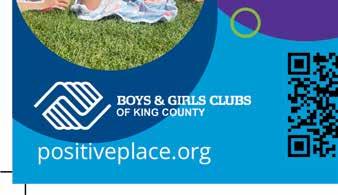



























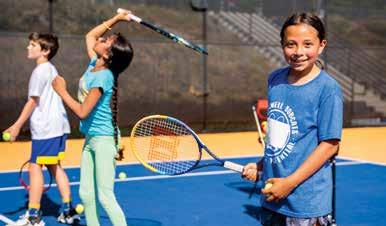
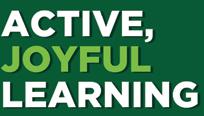





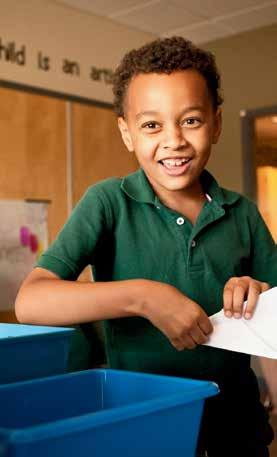









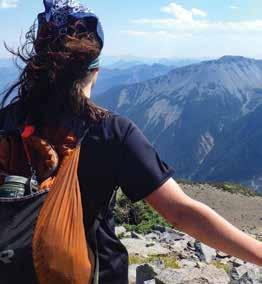



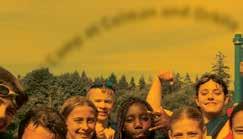


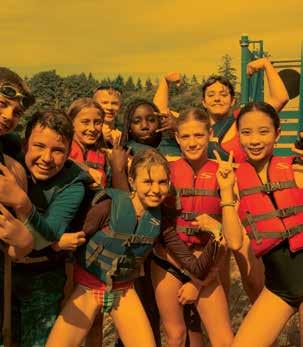





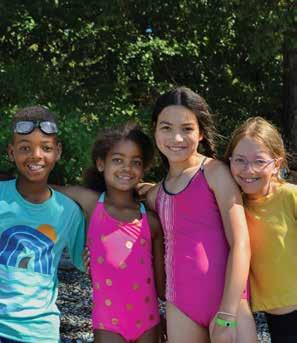







Day or sleepaway camp is the perfect place for teens to transition to the world of the employed. The paycheck is nice, but being a camp counselor has other rewards, too.
1/ The gift of responsibility
As much as teens may complain about it, learning responsibility is the gateway to more independence. Camp is an ideal place to build accountability, because teens oversee kids and activities while still being supervised themselves. As they have fun at camp, teens also get a glimpse into the adult world as they are guided through the experience.
2/ The opportunity to be a role model
Teens can connect to kids in ways that adults sometimes can’t, and when teens work at camp, they experience the fulfillment of helping younger kids meet their goals and develop new skills.
3/ Refined relationship skills
From fun sports competitions to getting chores done for inspection, counselors and campers must work together. Some camps even offer staff communication training and morale-building activities before camp starts, as a way to encourage teamwork.
4/ Improved time management skills
Teen counselors must arrive on time to camp activities and lessons, and have supplies for crafts or activities set up ahead of time. These time-management lessons will benefit teens as they enter college and the workplace.
5/ Time away from technology
Most camps either have a no-device policy or allow technology only for brief scheduled periods. Teen counselors can benefit from a “digital detox,” getting back to nature, sports and faceto-face socialization.
6/ Preparation for being away at college
Being away from home for an extended period for the first time can cause homesickness, and getting through it takes some emotional adjustment. Teen camp counselors have experienced these feelings and learned to deal with them before they go to college.

7/ A chance to share talents and skills
Is your teen an athlete, artist or nature enthusiast? Can he or she dance, write or create computer programs? Camp is an ideal place for teens to share strengths, and it introduces them to opportunities they may not have considered. It builds confidence and opens doors to future careers.
8/ Saving on summer expenses
One advantage of working at an overnight camp is that meals and lodging are usually provided. Staffers work and live at the camp, so gas use is minimal. Teen counselors chaperone camp trips to amusement parks and museums, which are usually covered by the camp, and all are positive perks for a summer job.
9/ Résumé building
Camp experience is beneficial if your teen wants to teach or coach, but working at camp also builds communication, collaboration and problem-solving skills. All are well worth including on a résumé, and they may just catch a future employer’s interest.
10/ A new appreciation for you
Being a teen counselor involves stamina, patience and responsibility. Teens who are camp counselors may begin to recognize how hard parenting actually is. With that recognition, they may have a new appreciation for all their parents do.
If your teen is interested in beginning the adventure that comes with being a camp counselor, you can find more information at the American Camp Association website (acacamps.org/staff-professionals/job-center). ■
Janeen Lewis is a writer, teacher, and mom to Andrew and Gracie. Her summer as a camp counselor gave her invaluable skills.
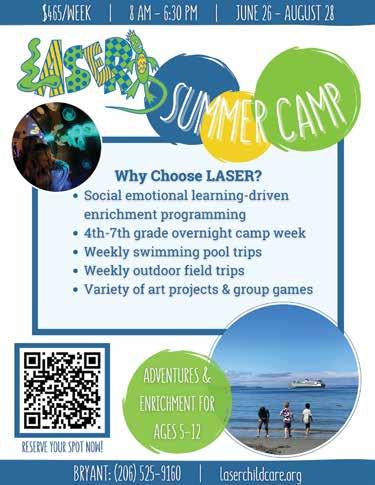


RSM
award-winning after-school math enrichment program. Students can choose from a variety of K-12 courses that will be taught during our 6-week summer session.
RSM is
the top 10 schools in the world.”
-Johns Hopkins Center for Talented Youth





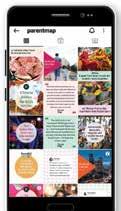


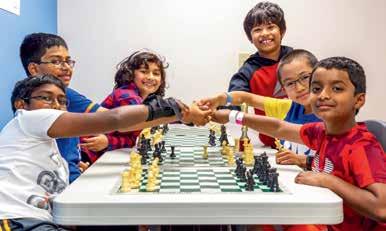


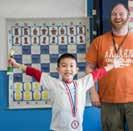
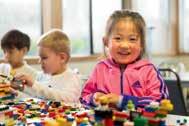













































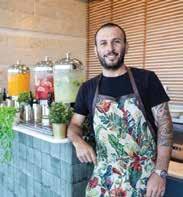



































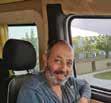
































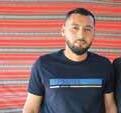













Explore Pacific County’s 10+ museums this May 2024!



Experience the rich cultural heritage and discover our destination’s history.
Get your passport and collect a stamp from each museum to be entered for a chance to win a prize.







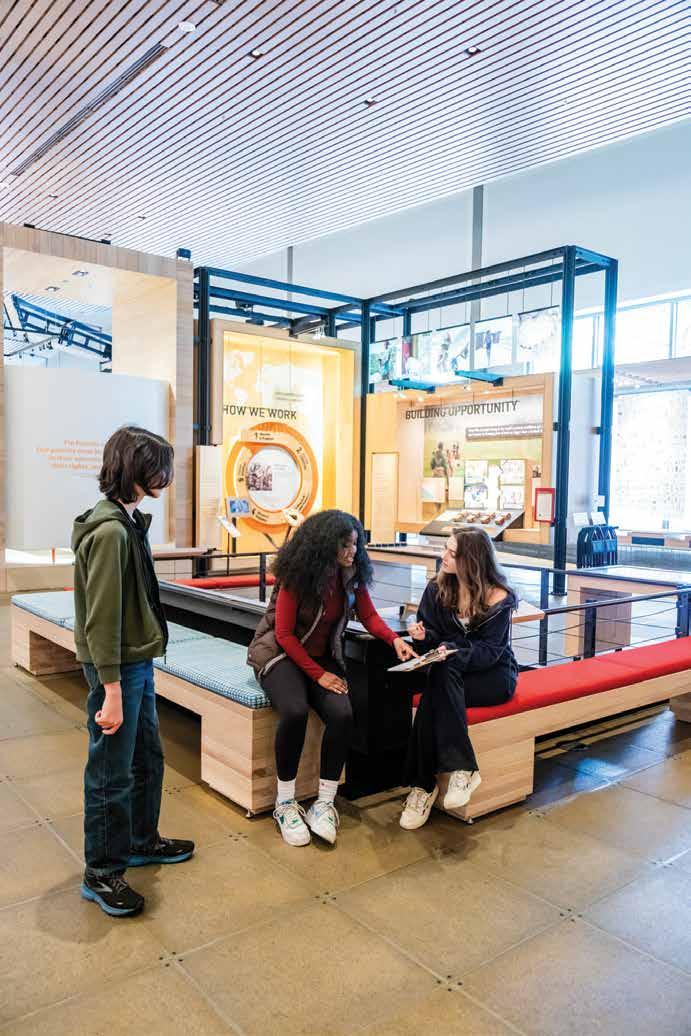
Exploreschoolexperiencesfocusedon globalhealth,genderequality,sanitation, designthinking&more!


AcrossfromSeattleCenter
Wednesday–Saturday 10amto5pm Publictoursat2pm
AlwaysFree discovergates.org/education @discovergates
EDUCATORS: Now booking in-person and virtual school tours!






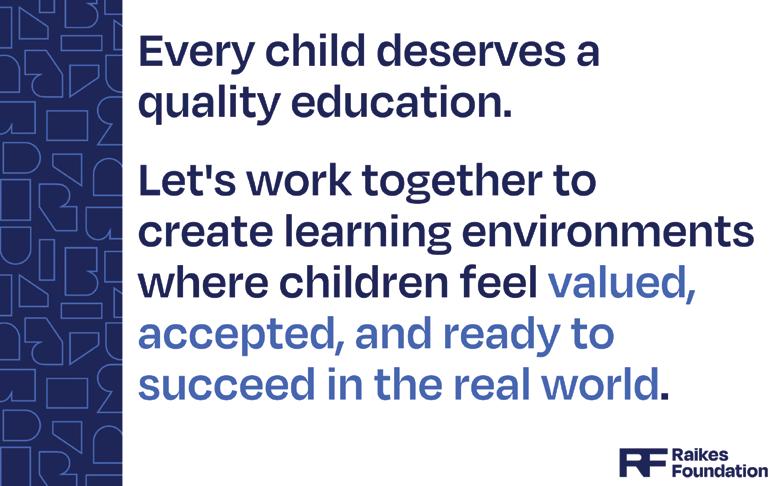
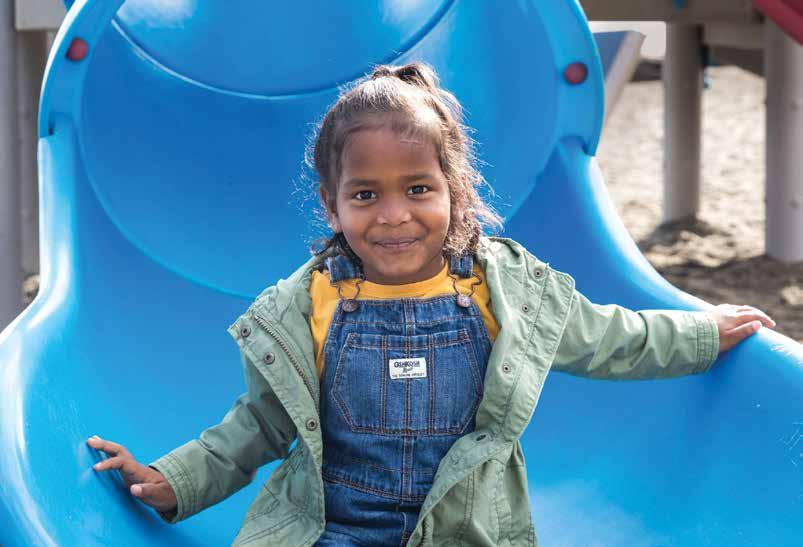
Seattle Children’s is proud to be the presenting sponsor of the 2023–2024 ParentEd Talks series
Scan the QR code below to sign up for Seattle Children’s Good Growing e-newsletter. Each issue shares timely tips to keep your family as safe and healthy as they can be.
What do foodie families love more than a really great restaurant? How about a bunch of really great restaurants all in the same place? With several counter-service stalls in one space, food halls are the perfect compromise for families with picky eaters, adventurous epicureans, diners with dietary restrictions and just about everyone else — a one-stop dining destination that ensures no one leaves hangry.
Spice Bridge, Tukwila
The bustling, 2,800-square-foot Spice Bridge Global Food Hall in Tukwila was first cooked up by the Food Innovation Network in an effort to remove some of the economic barriers for immigrants attempting to launch a restaurant business. Now the hall is a busy culinary hub for immigrant and refugee business owners. The kitchen hosts several cooking stations and food stalls along with a laid-back dining area. Eight diverse vendors dish out authentic flavors from around the globe on a rotating basis. Kid-tested favorites include mantu — juicy meat-filled dumplings — from Jazze’s Organic Afghan Fusion; hearty beef stew from Taste of Congo; and a Zanzibar spin on doughnuts from African fusion stall Moyo Kitchen.
ASEAN Streat Food Hall, Seattle
Want to take a trip through the street markets of Southeast Asia? Just step inside the ASEAN Streat Food Hall, in downtown Seattle’s Westlake Center. Founded by a former restaurateur and avid traveler from Thailand, the food hall brings traditional Southeast Asian street food to the city. Funky decor and playful touches, like the


colorful plastic crates suspended from the ceiling, re-create the vibrant market atmosphere, with eight food carts serving authentic street-food specialties from Thailand, Vietnam, Cambodia, Laos and other Southeast Asian countries. Must-trys are the noodles from Rolling Wok, served in an Insta-worthy instant ramen cup; fruit-topped honey toast from Sweet Moon; and for a parent’s much-needed caffeine fix, a Southeast Asian–style coffee from Kopi Cafe, brewed using a special steeping process.
Lincoln South Food Hall, Bellevue
Looking to grab a bite in downtown Bellevue? Head over to the second floor of Lincoln Square for its fabulously chic food hall that will satisfy both kids and grown-ups.
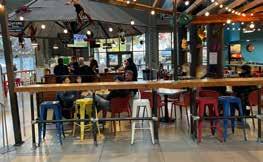

Choose from flavor-packed Korean barbecue from Seoul Bowl; authentic street tacos from West Coast Tacos; or a colorful and nutritious grain bowl from Wonderbowl. Parents can fuel up with artisanal coffee from the sleek Dote Coffee Bar; and teens will appreciate the bubble tea drinks from Drip Tea, with tongue-in-cheek names, such as B.F.F. and Flower Boy.
Crossroads Public Market, Bellevue
Another Eastside food destination, the Public Market, at the border of Bellevue and Redmond, inside Crossroads Bellevue, makes for a welcoming hangout on a bad-weather weekend. Sample your way through 17 stalls offering international eats from around the globe. Among the familyfriendly choices are Laotian hot pots from



continued from page 47
Blazing Bowl; Chinese dumplings from MiniMoon; and Piroshky Bakery’s piping-hot piroshki, a Russian handheld pie with sweet or savory fillings. Stop by after a play session at WiggleWorks or rock climbing at Edgeworks; or enjoy the mall carousel, the giant chess set or a live weekend performance on the Market Stage.
Armory Food and Event Hall, Seattle
If you find yourself around Seattle Center consider this pit stop for fueling up before or after playtime. The Armory Food and Event Hall gives off a playful patio vibe with pagodas, string lights and colorful seating, and has several crowd-pleasing food choices on offer. Picky-eater-approved options include the loaded fry plates at Cool Guys Fry Bar; crispy fish and chips from Matt’s Fish Basket; and Mexican coastal-style tacos at Blue Water Taco Grill. For dessert, head over to Seattle Fudge for an old-fashioned sweet treat.
Uwajimaya Food Hall, Chinatown–International District
In the center of Seattle’s Chinatown–International District, Uwajimaya Village is a cultural hub — a bustling one-stop cooperative of primarily small, family-owned retailers and businesses run by members of the local Asian American community. And the centerpiece is, of course, the food hall, which houses 12 unique restaurants, each taking you on a taste tour of different Asian cuisines. Kids will go wild for BeanFish’s taiyaki, cute fishshaped Japanese waffles stuffed with various fillings; or the chewy mochi doughnuts from Dochi. Family dinner options include the interactive hot pot experience at Boiling Point, or grab some hearty sandwiches from Hawaiian-themed Los Costeños.
The Kitchen at 9th & Hennepin, West Seattle
This commissary kitchen space in West Seattle started with an artisan doughnut shop and food truck. Now, besides the made-to-order doughnuts (which are absolutely delicious, and include inventive flavors such as Asian pear and lychee, and Chinese red date brioche), the kitchen hosts a number of other rotating food trucks and independent takeout-only restaurants. Among them: Melton’s BBQ, known for its succulent brisket and a white mac and cheese that your kids might just prefer over your homemade version; Loxsmith Bagels, for those yummy circles of carby deliciousness; wood-fired pizza; a burger joint; and three Thai options. All items are available for pickup or delivery. Let’s just say it’s a tough choice. ■
Kate Missine is a lifestyle writer, food lover and a girly girl raising two little boys. She has lived up and down the West Coast before settling in beautiful Sammamish with her family.
Every




knows – it really does take a village.
•
•
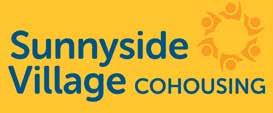














Jasmine McCarthy, LMHCA, provides counseling for kids ages 5 years and up, as well as adults of all ages, and family counseling. Jasmine offers her services online via telehealth throughout Washington state. Jasmine is also a yoga instructor and is available for one-on-one yoga therapy.






• Evidence-based parenting classes offered online in group settings or in family’s home
• Classes for parents with kids of all ages
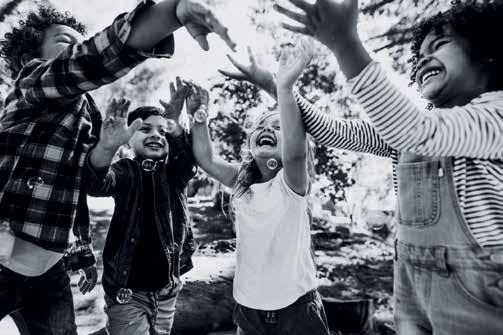

From bookstores to brew pubs, playgrounds to a hidden bridge, Ravenna is worth a lookBy Sharon Mead
Just north of the University of Washington, you’ll find Ravenna, a cozy Northeast Seattle neighborhood and one of Seattle’s hidden gems. Originally developed in 1890, Ravenna has grown into a quiet but worthwhile destination for families in search of outdoor activities, fabulous food and noteworthy landmarks.
There’s more than one place families should play in Ravenna. Ravenna Park is a worthy urban hiking destination. Gravel
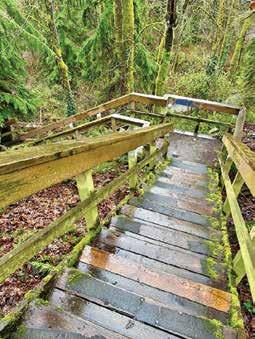
trails wind through the forested 70-acre park and can accommodate strollers and bikes, and are also ideal for walking; the half-mile loop takes about an hour to complete. Within Ravenna Park, you’ll also find a playground, wading pool, picnic
areas, ball fields and tennis courts, as well as another playground in Cowen Park, at the west end of the nature reserve.
Ravenna-Eckstein Community Center is also worth the stop. Attached to Ravenna Elementary School, this community center offers a large outdoor playground with options for older and younger kids, swings (including a tire swing), plus basketball and tennis courts. A curvy climbing structure, with its otherworldy design, is sure to challenge young climbers. The adjacent ball field doubles as a dog exercise area, so bring your pup along to play.
When you are ready to refuel, stop in at Third Place Books on N.E. 65th Street. Its delightful kids’ book section and small children’s indoor play area are a hit in any season. Plus, Cafe Arta’s welcoming space means you can stay a while longer to enjoy a coffee or meal, and its outdoor seating is a bonus on warmer days.
Another notable stop along N.E. 65th is Bagel Oasis, where New York–style bagels have been a staple since 1988. Try one of its specialty sandwiches, an omelet or a cream-cheese-schmeared bagel. The sun-dried tomato with basil cream cheese is our favorite!
Or pop into Zary Bakery next door, where the crew turns out delicious, unique French pastries, such as the Top Tart — the flakiest jam-filled toaster tart you’ll ever taste — or the stunning green-striped pistachio croissant. There is a variety of other baked goods and cafe drinks that are bound to satisfy everyone’s sweet tooth.
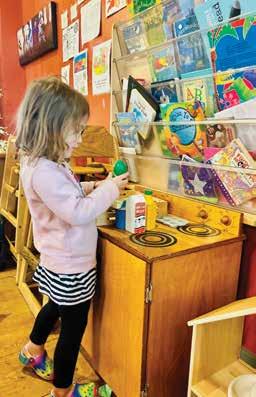
A little farther east on 65th, past 25th Avenue N.E., you’ll arrive at the Bryant Corner Cafe & Bakery. Locals order the French toast for breakfast or stop by later in the day to enjoy family-friendly dinner options — even meatloaf! This former corner drugstore, which the cafe’s owner frequented as a youth, is a neighborhood treasure.
Over on Ravenna Boulevard, stop by the Seven Market & Cafe, a small family-owned coffee roaster, market and cafe, to find Hawaiian coffees and signature coffeebean blends. There’s even a Candy Cane Lane holiday blend that honors the neighborhood. Seven is housed in what was once a 1922 grocery, and it now operates as a zero-waste establishment.
Kid-friendly dining that parents can also enjoy does exist! To find it, point your GPS to Ravenna Brewery — its brews on tap and daily food trucks (two on Saturdays) keep it interesting. ■
Sharon Mead is a Seattle-native and an enthusiast when it comes to coffee, cooking, words, reading and the Mariners.
Check out many more happenings online at parentmap.com/calendar
By Julie Dodobara
With longer days and sunnier weather, April is positively blooming with possibilities. Fields of flowers, Earth Day, and the return of familyfavorite fairs and festivals offer a bounty of opportunities to get outside, celebrate nature and create memories with your crew. Go forth and enjoy the splendor of spring, friends!
� Speaking of April flowers, head north to Skagit Valley to marvel at the gorgeous fields of tulips alive with color. Some places will even allow families to bring their furry friends along. Mother Nature determines the blooming schedule; the festival runs April 1–30.
� Walk among the dinosaurs, excavate fossils and train a raptor at Jurassic Quest when it roars into town. Your dino enthusiast will be enthralled by the life-size interactive displays. T. rex, apatosaurus and the rest of the herd will be at the Seattle Convention Center, Friday–Sunday, April 5–7. $19–$22 per person; additional charge for rides.
� The PAW Patrol crew swoops into town on a heroic rescue mission — live shows take place at four local venues. Join Ryder, Chase, Marshall and Skye on their quest to save the day; shows take place Friday–Saturday, April 5–6 at Angel of the Winds Arena in Everett; Wednesday–Thursday, April 10–11 at accesso ShoWare Center in Kent; Saturday–Sunday, April 13–14 at the Tacoma Dome; and Tuesday–Wednesday, April 16–17 at McCaw Hall in Seattle. Tickets start at $25.
� More gorgeous blooms abound at Pierce County’s lovely Daffodil Festival. The Daffodil Grand Floral Parade, with floats, marching bands
and Daffodil Princesses, progresses through four communities, all on Saturday, April 6. Join the fun at 10:15 a.m. in Tacoma; 12:45 p.m. in Puyallup; 2:30 p.m. in Sumner; and 5 p.m. in Orting. Free.
� Chugga, chugga! All aboard for free mini train rides around the park. Saturdays, April 13 and 27 are the first two dates of the season for Kitsap Live Steamers mini-train rides, welcoming railroad fans of all ages to fun train rides at Port Orchard’s South Kitsap Regional Park. Rides continue the second and fourth Saturdays of the month, plus some holidays, through October.
Highlighted Events for April
April 12–14
Seattle Cherry Blossom & Japanese Cultural Festival
Seattle Center
� You know you’ve been waiting for this. Rain or shine, the Washington State Spring Fair is a springtime family favorite, and it is back for eight funfilled days of tasty fair food, farm animals, rides and entertainment. Mark your calendar for April 11–14 and 18–21. Tickets $TBA per person; ages 5 and younger enter free.
� April keeps coming up flowers! Visit Seattle Center for the annual Seattle Cherry Blossom & Japanese Cultural Festival and partake in food, demos and performances that showcase Japanese and Japanese American cultural traditions. Friday–Sunday, April 12–14, 11 a.m.–5 p.m. Free.

� Mark your calendar to attend the South Sound Sustainability Expo, the region’s largest community celebration of all things sustainable for the whole family. Gather ideas for living green, plus turn young minds and hands on to ideas and demos for helping our planet. Saturday, April 13, 10 a.m.–3 p.m., at University of Washington Tacoma. Free.
April 16 | Tuesday
ParentEd Talks: Stronger Together: A New Model for Modern Marriage Online
April 27 | Saturday
Sheep Shearing at Kelsey Creek Farm Bellevue

� Stroll through an enchanting, seldom open wildlife preserve and learn about its five types of habitat as well as its natural bounty while you explore. Save the date to visit the Morse Wildlife Preserve on its first-ofthe-season open day, Sunday, April 14, 9 a.m.–3 p.m. Free; no dogs allowed.
� We’ve all heard that relationships take work. Join ParentMap on Tuesday, April 16 at 1 p.m. to learn the secrets to a happier, healthier home with marriage experts Nate and Kaley Klemp. The couple will discuss strategies behind their 80/80 marriage model that will result in stronger, more fulfilling bonds with your loved ones. Preregister.
� Be pivotal in the plot’s outcome when you attend StoryBook Theater’s adapta-
tion of a classic Hans Christian Andersen fairy tale. In StoryBook’s “A Little Mermaid,” the audience decides if our heroine, Sirena, should keep her human form or return home to the sea. You can catch performances at the Everett PUD Auditorium, Saturday, April 20; and at the Kirkland Performance Center, Saturday–Sunday, April 27–28 and Sunday, May 5. Tickets $15.
� Celebrate global unity and understanding at the free and heartwarming International Children’s Friendship Festival, featuring kids performing music and dance from cultures around the globe. Bring the family to Seattle Center, where the festival takes place Saturday–Sunday, April 20–21, 11 a.m.–6 p.m. Free.
� On Saturday, April 20, enjoy
free admission to Washington’s national parks to mark the first day of National Parks Week. On Monday, April 22, visit one of our amazing state parks to celebrate Earth Day — no Discover Pass required. Head for the hills, the beach, the trees and explore the wild!
� Indulge in a special sweet treat to celebrate Passover with festive Passover-themed cupcakes. These beauties are from the local cupcake whizzes at Trophy Cupcakes and are available starting April 21. Passover cupcakes are flourless and free of grains and leavening agents, though not officially kosher.
� A sure sign of the season, it’s time for our woolly friends to get their annual spring haircut. Turn up at Kelsey Creek Farm to ride a pony, meet farm animals,

take a tractor-pulled wagon ride and watch the resident sheep get sheared at this family-favorite event. Sheep shearing is Saturday, April 27, 11 a.m.–4 p.m. Free admission; some activities have fees. ■
Julie Dodobara is ParentMap’s calendar editor.
International Children’s Friendship Festival






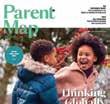

Getting kids to brush their teeth is one of those battles it’s guaranteed you’ll have to fight (at least a few times) during your parenting journey. And if you have a sensory-sensitive child, it can be even more challenging, as they often avoid many of the textures, tastes and scents associated with brushing their teeth because these sensations are either overstimulating or not stimulating enough. However, using the right tools can make all the difference in this daily routine. While the products outlined below are designed with sensory-sensitive kids in mind, any kid may benefit from using them if toothbrushing is a struggle.
• Find kid-friendly toothpaste. For many kids, mint-flavored toothpaste tastes sharp or bitter, or may even feel like it burns. Luckily, there are many other flavor options available for kids today: vanilla, strawberry, bubblegum, watermelon. Try different flavors until you hit on one that works for you child, or consider using a flavor-free toothpaste.
• Experiment with floss. Floss is no longer a one-size-fits-all product. Different flavors and sizes give parents options for tailoring their child’s oral health routine. Another option is swapping long, unwieldy strands of floss for floss picks. Specially designed for kid use, these picks can make flossing easier for some children.

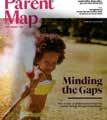



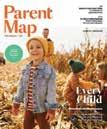



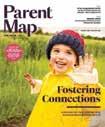
• Start with the right toothbrush. Switch your regular toothbrush for one with soft or silicone bristles for a gentler brushing experience. Using a soft-bristled toothbrush or multisided toothbrush may help to massage gums and reduce pain while brushing. The same is true of silicone toothbrushes. U-shaped silicone brushes (also available in electronic versions) can be game changers for kids with sensory sensitivities.
Once you’ve found the right tools for your child to use, remember to set up a clear and consistent oral health routine for kids to follow. Timers, toothbrushing apps and reward systems can all be part of your child’s toothbrushing routine. ■
— Allison Sutcliffe





















It’s never been more important to send your
school. Fortunately, it’s also never
Families making up to $350K never pay more than $15,900
